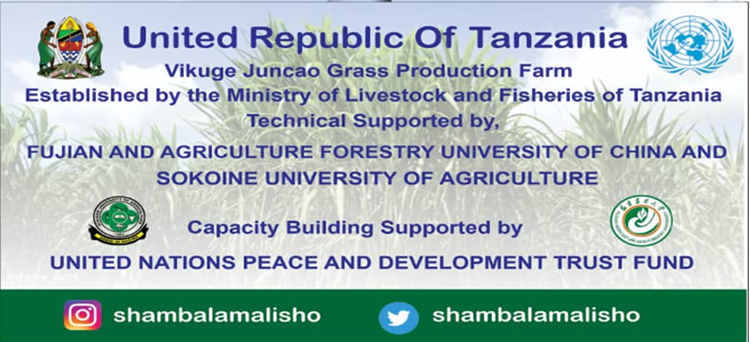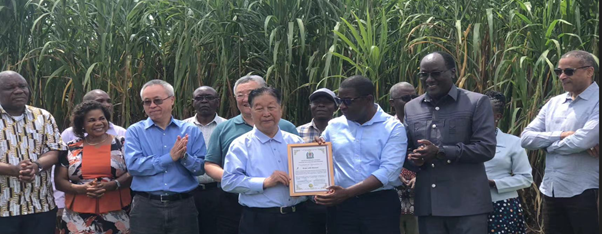Aim: To assess the implementation of the JUNCAO-TZ project in Tanzania. The project is being implemented by the Department of Biosciences at Sokoine University of Agriculture, in collaboration with the Ministry of Livestock and Fisheries, Tanzania. It receives technical support from Fujian Agriculture and Forestry University, China, and is funded by the United Nations Peace and Development Trust Fund.

"In the front row, from left to right: Prof. Maulid Mwatawala, Deputy Vice Chancellor for Academic Research and Consultancy at Sokoine University of Agriculture (SUA); Prof. Zhanxi Lin, Chief Scientist and Inventor of Juncao Technology, Fuzhou, Fujian, China; Alhaji Aboubakari Kunenge, Regional Commissioner of the Coastal Region; Hon. Abdallah Ulega, Minister of Livestock and Fisheries; Mr. Earle Courtenay Rattray, Chef de Cabinet of the United Nations; Mr. FU Cong, Permanent Representative of the People's Republic of China to the United Nations; Mr. LI Junhua, Under-Secretary-General for Economic and Social Affairs at the United Nations. Photo taken at Vikuge Farm in Kibaha on 9th August 2024."
1.0 Introduction
A United Nations delegation visited the United Republic of Tanzania from 7th to 10th August 2024. The purpose of this visit was to assess the implementation and progress of Juncao technology adoption in Tanzania. Field visits and bilateral meetings were conducted on 8th August 2024 in Zanzibar and 9th August 2024 in mainland Tanzania.
1.1 Composition of the Delegation
a. The Steering Committee Members of the United Nations Peace and Development Fund included:
- Mr. Earle Courtenay Rattray, Chef de Cabinet (CDC) to the United Nations Secretary-General, Steering Committee Member of the United Nations Peace and Development Trust Fund
- Mr. FU Cong, Permanent Representative of the People's Republic of China to the UN, Steering Committee Member of the United Nations Peace and Development Trust Fund
- Mr. LI Junhua, Under-Secretary-General for Economic and Social Affairs, United Nations Department of Economic and Social Affairs, Steering Committee Member of the United Nations Peace and Development Trust Fund
- The United Republic of Tanzania Team included:
- Mr. Alhaji Aboubakari Kunenge, Regional Commissioner of the Coastal Region
- Hon. Abdallah Ulega, Minister of Livestock and Fisheries, Tanzania
- Prof. Daniel Mushi, Deputy Permanent Secretary, Ministry of Livestock and Fisheries, Tanzania
- Prof. Maulid Mwatawala, Deputy Vice Chancellor for Academic, Research and Consultancy, Sokoine University of Agriculture (SUA), Tanzania
- Prof. Yasinta Muzanila, PI, JUNCAO TZ
- Dr. Elly Ligate, Co-PI & Juncao Ambassador, JUNCAO TZ
- Dr. Beda John Mwang’onde, Researcher, JUNCAO TZ and Head of the hosting Department, JUNCAO TZ, SUA
- Dr. Offoro N. Kimambo, Researcher, JUNCAO TZ.
The field and bilateral meetings were also attended by the Minister of Livestock and Fisheries, the Permanent Secretary of the Ministry of Livestock and Fisheries, experts from Sokoine University of Agriculture, and a delegation from Fujian Agriculture and Forestry University (FAFU) in Fuzhou, Fujian, China, led by Prof. Zhanxi Lin, the Chief Scientist and Inventor of Juncao Technology. Livestock keepers, mushroom producers, and processors were also present.
1.2 Implementation of Juncao Technology in Tanzania
The Juncao Technology project in Tanzania is implemented through collaboration among the following organizations, ministries, and institutions:
- Department of Biosciences, College of Natural and Applied Sciences, Sokoine University of Agriculture (SUA)
- Ministry of Livestock and Fisheries, Tanzania Mainland
- Ministry of Agriculture, Natural Resources, Irrigation, and Livestock, Tanzania Zanzibar
- International Center of Juncao Technology and Engineering, Fujian Agriculture and Forestry University, Fuzhou, China
- United Nations Department of Economic and Social Affairs (UNDESA), which has funded the project since March 2023

Signpost of the collaborators on implementation of Juncao technology in Tanzania Mainland (Photo taken at Vikuge Pasture Farm on 9 August 2024.

Signpost of the collaborators on implementation of Juncao technology in Tanzania Mainland (Photo taken at Kizimbani Pasture Production Farm- Unguja Zanzibar on 9 August 2024.
1.3 Remarks from the Delegates
1.3.1 Minister of Livestock and Fisheries
In his welcoming remarks, Hon. Abdallah Ulega, Minister of Livestock and Fisheries, commended the Government of Tanzania, under the leadership of Her Excellency Dr. Samia Suluhu Hassan, for its adoption and implementation of Juncao technology to tackle agricultural challenges and foster sustainable development.
The Minister noted that this technology is generating economic activities and contributing to Tanzania’s rapid transformation, particularly in the livestock sector and in enhancing income generation. He emphasized that Juncao technology plays a crucial role in advancing several Sustainable Development Goals (SDGs), specifically SDG 1 (No Poverty), SDG 2 (Zero Hunger), SDG 3 (Good Health and Well-being), SDG 8 (Decent Work and Economic Growth), and SDG 13 (Climate Action).
1.3.2 Deputy Permanent Secretary
Prof. Daniel Mushi, Deputy Permanent Secretary at the Ministry of Livestock and Fisheries, stated, “Juncao technology is being implemented in Tanzania to address the shortage of livestock fodder and to mitigate conflicts between livestock keepers and crop growers.”

Participants posing for a group photo when Prof. Lin Zhanxi receiving a medal from the Minister, Ministry of Livestock and Fisheries: Photo taken on 9th August 2024.
1.3.3 Deputy Vice Chancellor for Academic Research and Consultancy
Prof. Maulid Mwatawala, Deputy Vice Chancellor for Academic Research and Consultancy at Sokoine University of Agriculture (SUA), Morogoro, Tanzania, informed the delegation that SUA, as a leading agriculture-based institution in Tanzania, should continue its research into Juncao Technology and other innovations. He emphasized the importance of supporting the livestock and agriculture sectors through advancements in fodder and mushroom production. Prof. Mwatawala reaffirmed SUA’s commitment to collaborating with both national and international stakeholders to ensure the widespread dissemination, adoption, and implementation of Juncao technology in the country.
1.3.4 Chief Scientist and Inventor of Juncao Technology
Prof. Zhanxi Lin, Chief Scientist and Inventor of Juncao Technology, acknowledged Tanzania’s significant progress in implementing Juncao Technology. He proposed that Sokoine University of Agriculture could serve as a regional hub for Juncao technology in East Africa. Prof. Lin also pledged to collaborate with SUA to conduct further research on Juncao technology, particularly its application in managing ecologically degraded ecosystems.
1.3.5 Chef de Cabinet
In his closing remarks, Mr. Earle Courtenay Rattray, Chef de Cabinet, recognized the substantial progress Tanzania has made in implementing Juncao technology. He emphasized the United Nations' interest in observing tangible socio-economic transformations among farmers resulting from the technology’s adoption and implementation. Mr. Rattray also assured that the United Nations Department of Economic and Social Affairs (UNDESA) would continue to support and promote projects that address the Sustainable Development Goals in Tanzania.

Participants of the delegation posing for a group’s photo at Vikuge Pasture Farm in Kibaha, Coastal Region in Tanzania: Photo taken on 9th August 2024.
4.0 Juncao Technology
Juncao technology involves the cultivation of Juncao grass, which can be used for livestock fodder, as a substrate for mushroom production, for controlling soil erosion and sedimentation, managing degraded ecosystems, producing bioenergy and pulp, and sequestering carbon dioxide. Dr. Elly Ligate, a Senior Researcher and Consultant at Sokoine University of Agriculture, introduced Juncao technology in Tanzania in 2021. The technology has been piloted in various regions, including Simiyu, Geita, Kilimanjaro, Kagera, Morogoro, Mbeya, Pwani, Dar es Salaam, Dodoma, Iringa, and Ruvuma on the Tanzanian mainland, as well as Unguja and Pemba in Zanzibar.




